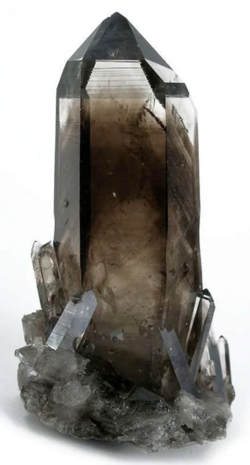Chemistry:Smoky quartz
| Smoky quartz | |
|---|---|
 | |
| General | |
| Category | Silicate minerals |
| Formula (repeating unit) | SiO2 |
| Strunz classification | 04.DA.05 |
| Dana classification | 75.01.03.01 |
| Crystal system | α-quartz: trigonal trapezohedral class 3 2; β-quartz: hexagonal 622[1] |
| Space group | Trigonal 32 |
| Unit cell | a = 4.9133 Å, c = 5.4053 Å; Z=3 |
| Identification | |
| Colour | Brown to grey, opaque |
| Crystal habit | 6-sided prism ending in 6-sided pyramid (typical), drusy, fine-grained to microcrystalline, massive |
| Twinning | Common Dauphine law, Brazil law and Japan law |
| Cleavage | {0110} Indistinct |
| Fracture | Conchoidal |
| Tenacity | Brittle |
| Mohs scale hardness | 7 – lower in impure varieties (defining mineral) |
| Vitreous – waxy to dull when massive|re|er}} | Vitreous – waxy to dull when massive |
| Streak | White |
| Diaphaneity | Transparent to nearly opaque |
| Specific gravity | 2.65; variable 2.59–2.63 in impure varieties |
| Optical properties | Uniaxial (+) |
| Refractive index | nω = 1.543–1.545 nε = 1.552–1.554 |
| Birefringence | +0.009 (B-G interval) |
| Pleochroism | weak, from red-brown to green-brown |
| Melting point | 1670 °C (β tridymite) 1713 °C (β cristobalite)[1] |
| Solubility | Insoluble at STP; 1 ppmmass at 400 °C and 500 lb/in2 to 2600 ppmmass at 500 °C and 1500 lb/in2[1] |
| Other characteristics | lattice: hexagonal, Piezoelectric, may be triboluminescent, chiral (hence optically active if not racemic) |
| References | [2][3][4][5] |
Smoky quartz is a brownish grey, translucent variety of quartz that ranges in clarity from almost complete transparency to an almost-opaque brownish-gray or black crystals.[6] The color of smoky quartz is produced when natural radiation, emitted from the surrounding rock, activates color centers around aluminum impurities within the crystalline quartz. [7]
Varieties
Morion is a very dark brown to black opaque variety. Morion is the German, Danish, Spanish and Polish synonym for smoky quartz.[8] The name is from a misreading of mormorion in Pliny the Elder.[9]
Cairngorm is a variety of smoky quartz found in the Cairngorm Mountains of Scotland.[10] It usually has a smoky yellow-brown colour, though some specimens are greyish-brown. It is used in Scottish jewellery and as a decoration on kilt pins and the handles of sgianan-dubha (anglicised: sgian-dubhs or skean dhu).[11] The largest known cairngorm crystal is a 23.6 kg (52 lb) specimen kept at Braemar Castle.[citation needed]
Uses
Smoky quartz is common and was not historically important, but in recent times it has become a popular gemstone, especially for jewelry.[12]
Sunglasses, in the form of flat panes of smoky quartz, were used in China in the 12th century.[13]
See also
References
- ↑ 1.0 1.1 1.2 Deer, W. A., R. A. Howie and J. Zussman, An Introduction to the Rock Forming Minerals, Logman, 1966, pp. 340–355 Script error: No such module "CS1 identifiers".
- ↑ "Quartz". Handbook of Mineralogy. III (Halides, Hydroxides, Oxides). Chantilly, VA, US: Mineralogical Society of America. ISBN 0962209724. http://rruff.geo.arizona.edu/doclib/hom/quartz.pdf.
- ↑ Quartz. Mindat.org. Retrieved on 2013-03-07.
- ↑ Quartz. Webmineral.com. Retrieved on 2013-03-07.
- ↑ Hurlbut, Cornelius S.; Klein, Cornelis (1985). Manual of Mineralogy (20 ed.). ISBN 0-471-80580-7. https://archive.org/details/manualofmineralo00klei.
- ↑ "Smoky Quartz: Smoky Quartz mineral information and data.". http://www.mindat.org/show.php?id=3689.
- ↑ "Smoky Quartz: A transparent brown gem & gem material". https://geology.com/gemstones/smoky-quartz/.
- ↑ http://www.mindat.org/min-6270.html Morion on Mindat
- ↑ New Oxford American Dictionary (2nd ed., 2005), p. 1102.
- ↑ Shaw, Philip; Thompson, Des B. A. (12 June 2006) (in en). The Nature of the Cairngorms: Diversity in a Changing Environment. The Stationery Office. p. 22. ISBN 978-0-11-497326-1. https://books.google.com/books?id=mVp6qGygeVgC&pg=PA22.
- ↑ Chisholm, Hugh, ed (1911). "Cairngorm". Encyclopædia Britannica. 4 (11th ed.). Cambridge University Press. p. 952.
- ↑ "The Gemstone Smoky Quartz". http://www.minerals.net/gemstone/smoky_quartz_gemstone.aspx.
- ↑ Joseph Needham, Science & Civilisation in China (Cambridge, England: Cambridge University Press, 1962), volume IV, part 1, page 121. Needham states that dark glasses were worn by Chinese judges to hide their facial expressions during court proceedings.
- Holden, Edward (1925). "The Cause of Color in Smoky Quartz and Amethyst" in American Mineralogist, vol. 9, pp. 203–252
External links
 |
